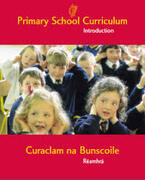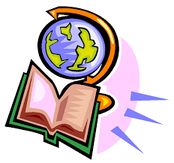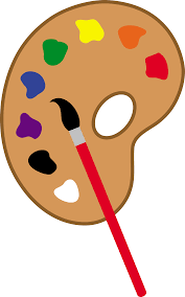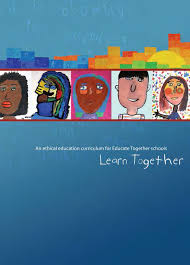Quick links
You might like to read about our work in the following areas:
Primary School Curriculum
About the curriculum
The primary school curriculum was published in 1999 and contains 7 main areas. These 7 areas are further split into a total of 12 subjects:
The curriculum is split into 4 levels:
Our special classes are taught using a modified version of this curriculum, along with additional resources and programmes.
You can explore the curriculum on the NCCA website, or you can scroll down to see the main topics and areas covered in each subject.
- Language: English and Gaeilge
- Mathematics
- Social, Environmental and Scientific Education (S.E.S.E): Science, History and Geography
- The Arts Education: Visual Arts, Music, Drama
- Physical Education
- Social Personal and Health Education (SPHE)
- Ethical Education (This is the curriculum taught in Educate Together schools)
The curriculum is split into 4 levels:
- Junior and Senior Infants
- 1st and 2nd Class
- 3rd and 4th Class
- 5th and 6th Class
Our special classes are taught using a modified version of this curriculum, along with additional resources and programmes.
You can explore the curriculum on the NCCA website, or you can scroll down to see the main topics and areas covered in each subject.
Subject areas
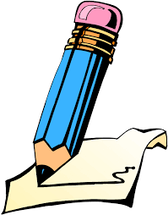
English
Over the past few years, like all national schools in Ireland, we have been implementing the new Primary Language Curriculum, which covers both English and Irish. The strands of the English curriculum are:
- Recount (telling what happened)
- Persuasive (convincing the reader)
- Explanation (explaining how or why something happens/works)
- Report (describes what something was like and gives information on it)
- Procedural (guides the reader how to do something, in steps)
Other key areas of learning include spelling, phonics, grammar, free writing, dictionary work, vocabulary and much more, under these strands.
Over the past few years, like all national schools in Ireland, we have been implementing the new Primary Language Curriculum, which covers both English and Irish. The strands of the English curriculum are:
- Oral Language: This strand focuses on the development of speaking and listening skills.
- Reading: This strand focuses on learning and developing reading skills, including comprehension strategies and reading across a variety of genres.
- Writing: We have our own writing policy. Pupils will learn and develop 6 different writing genres during their 8 years of primary education:
- Recount (telling what happened)
- Persuasive (convincing the reader)
- Explanation (explaining how or why something happens/works)
- Report (describes what something was like and gives information on it)
- Procedural (guides the reader how to do something, in steps)
Other key areas of learning include spelling, phonics, grammar, free writing, dictionary work, vocabulary and much more, under these strands.
Gaeilge
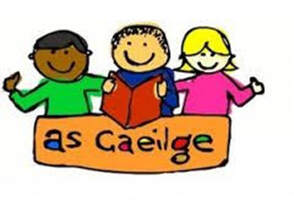
The Irish curriculum is part of the new Primary Language Curriculum, which was introduced in recent years. Just like the English curriculum, it has 3 strands:
Gaeilge is generally taught across 10 themes/topics – this is the case across all class levels. These themes are:
- Mé Féin (myself)
- Éadaí (clothes)
- Bia (food)
- Caitheamh Aimsire (pastimes)
- An Scoil (school)
- Sa Bhaile (Home)
- Siopadóireacht (shopping)
- Teilifís (television)
- Aimsir (weather)
- Ócáidí Speisialta (special occasions).
- Teanga ó Bhéal (Oral Language)
- Léitheoireacht (Reading)
- Scríbhneoireacht (Writing)
Gaeilge is generally taught across 10 themes/topics – this is the case across all class levels. These themes are:
- Mé Féin (myself)
- Éadaí (clothes)
- Bia (food)
- Caitheamh Aimsire (pastimes)
- An Scoil (school)
- Sa Bhaile (Home)
- Siopadóireacht (shopping)
- Teilifís (television)
- Aimsir (weather)
- Ócáidí Speisialta (special occasions).
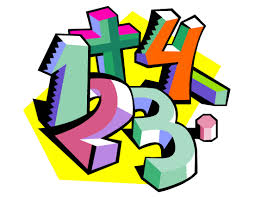
Mathematics
The maths curriculum is split into 5 main strands:
The Junior and Senior Infant curriculum also has the strand Early Mathematical Activities (classifying, matching, comparing, ordering).
Problem-solving is a key skill which is developed through all areas of the maths curriculum.
The maths curriculum is split into 5 main strands:
- Number (Place value, Operations, Fractions, Decimals)
- Algebra (Patterns, Sequences, Equations)
- Shape and Space (2-D shapes, 3-D shapes, Lines and angles)
- Measures (Weight, Length, Capacity, Money, Time, Area)
- Data (Representing data, Chance)
The Junior and Senior Infant curriculum also has the strand Early Mathematical Activities (classifying, matching, comparing, ordering).
Problem-solving is a key skill which is developed through all areas of the maths curriculum.
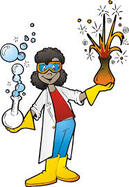
Science
The four strands of the science curriculum are:
Pupils learn how to work as a scientist and participate in many experiments throughout their time in school. From 3rd - 6th class, our pupils also have a dedicated notebook to record their experiments.
The four strands of the science curriculum are:
- Living things (Human life, Plants and animals)
- Materials (Materials and change, Properties and characteristics)
- Energy and Forces (Light, Sound, Heat, Magnetism and electricity, Forces)
- Environmental awareness and care (Caring for the environment)
Pupils learn how to work as a scientist and participate in many experiments throughout their time in school. From 3rd - 6th class, our pupils also have a dedicated notebook to record their experiments.
History
There are only 2 strands in the Junior and Senior Infant History curriculum, building up to 7 strands by 5th and 6th class. In total, they are:
There are only 2 strands in the Junior and Senior Infant History curriculum, building up to 7 strands by 5th and 6th class. In total, they are:
- Local studies (learning about the history of the local area)
- Story (examples include learning about people from the past, Myths and legends, Using timelines)
- Early people and ancient societies (examples include the Stone Age, Bronze Age, Ancient civilisations)
- Life, society, work and culture in the past (examples include Life in the 18th/19th/20th centuries, Norman Ireland, Medieval towns, Life in Ireland since the 1950s)
- Eras of conflict and change (examples include The Renaissance, The Great Famine, The Industrial Revolution, World Wars)
- Politics, conflict and society (examples include Revolutions around the world, 1916 and the the foundation of the Irish state, Northern Ireland)
- Continuity and change over time (examples include Homes, Food and farming, Clothes, Transport, Education)
Geography
|
There are 3 strands in the Geography curriculum:
|
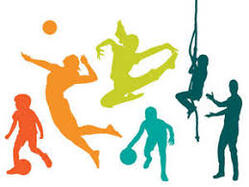
Physical Education (P.E.)
There are 6 strands in the P.E. curriculum:
As a school, we also focus on developing Fundamental Movement Skills. We focus on one per month, on rotation. This involves learning basic skills such as running, jumping, striking, throwing, balancing and others.
There are 6 strands in the P.E. curriculum:
- Athletics
- Dance
- Games
- Gymnastics
- Outdoor and Adventure
- Aquatics – the swim part of the aquatics curriculum is run from 1st – 4th class.
As a school, we also focus on developing Fundamental Movement Skills. We focus on one per month, on rotation. This involves learning basic skills such as running, jumping, striking, throwing, balancing and others.
Social, Personal and Health Education (SPHE)
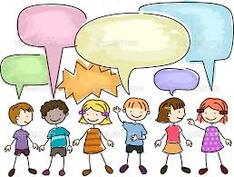
The SPHE curriculum has 3 strands:
Our SPHE curriculum is taught using programmes such as Weaving Well-being and Friends for Life. As a school, we are obligated to teach the Stay Safe programme every year, which focuses on child protection and welfare. We also teach RSE (Relationships and Sexuality Education) yearly.
- Myself (self-identity, safety and protection, taking care of my body, growing and changing)
- Myself and others (relating to other people, my family, friends, conflict resolution)
- Myself and the wider world (developing citizenship, media education)
Our SPHE curriculum is taught using programmes such as Weaving Well-being and Friends for Life. As a school, we are obligated to teach the Stay Safe programme every year, which focuses on child protection and welfare. We also teach RSE (Relationships and Sexuality Education) yearly.
Visual Arts
Drama
The drama curriculum consists of only 1 strand:
Drama is often integrated and used as a way to enhance the teaching and learning in other subject areas, such as History, Gaeilge and English.
- Drama to explore feelings, knowledge and ideas, leading to understanding
Drama is often integrated and used as a way to enhance the teaching and learning in other subject areas, such as History, Gaeilge and English.
Ethical Education
|
In Educate Together schools, the time allocated for Religious Education is given to our Ethical Education programme, which is called the Learn Together programme.
The 4 strands of the Learn Together programme are:
Our Ethical Education programme is interwoven into the ethos of our school and our day-to-day life. You can read more about our ethos here. |
Other learning areas
In addition to our teaching and learning in the 12 curriculum subjects, there are many other areas which are taught each day.
Values
Linked to our ethos and the Learn Together curriculum, we are a values-focused school. We highlight and celebrate one of the values of our Learn Together curriculum each month - you can see them here. Our values help to inform the ethos of our school. We also work hard to be a kind and caring school and strive to foster this in our community.
Linked to our ethos and the Learn Together curriculum, we are a values-focused school. We highlight and celebrate one of the values of our Learn Together curriculum each month - you can see them here. Our values help to inform the ethos of our school. We also work hard to be a kind and caring school and strive to foster this in our community.
Aistear
This is a play-based curriculum which we use in our infant classes. Children learn through play and spend up to an hour each day playing with different resources, being creative, using and learning language, having fun, interacting with their peers. You can see the Aistear curriculum here.
This is a play-based curriculum which we use in our infant classes. Children learn through play and spend up to an hour each day playing with different resources, being creative, using and learning language, having fun, interacting with their peers. You can see the Aistear curriculum here.
Independence and life skills
We place a high value on promoting pupil independence and life skills throughout their time in our school. From children learning to zip up their own coats in Junior Infants, to conflict resolution in 6th class, this is a hidden curriculum which is taught informally every single day.
We place a high value on promoting pupil independence and life skills throughout their time in our school. From children learning to zip up their own coats in Junior Infants, to conflict resolution in 6th class, this is a hidden curriculum which is taught informally every single day.
ICT
We are well-resourced in terms of ICT equipment in our school – we have class sets of ipads, chromebooks and laptops. Each classroom is kitted out with an interactive whiteboard, a visualiser and a camera. ICT is used in many subject areas and pupils develop their digital literacy skills throughout their time in our school.
We are well-resourced in terms of ICT equipment in our school – we have class sets of ipads, chromebooks and laptops. Each classroom is kitted out with an interactive whiteboard, a visualiser and a camera. ICT is used in many subject areas and pupils develop their digital literacy skills throughout their time in our school.
Themed weeks
Every year, we host and celebrate a number of themed weeks/fortnights, which allow us to focus on a certain topic as a whole-school. You can read about some of the topics we have explored here. We are also currently working towards our first Green School flag, which promotes learning and action around caring for the environment.
Every year, we host and celebrate a number of themed weeks/fortnights, which allow us to focus on a certain topic as a whole-school. You can read about some of the topics we have explored here. We are also currently working towards our first Green School flag, which promotes learning and action around caring for the environment.
Restorative Practice
As a school, we are on a restorative practice journey, meaning we are always working towards being a more restorative school. This informs our day-to-day interactions with our pupils, staff and wider community. It places an emphasis on fostering positive relationships with one another and developing conflict resolution skills and habits.
As a school, we are on a restorative practice journey, meaning we are always working towards being a more restorative school. This informs our day-to-day interactions with our pupils, staff and wider community. It places an emphasis on fostering positive relationships with one another and developing conflict resolution skills and habits.
